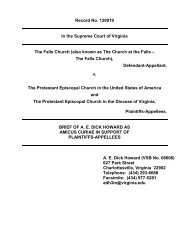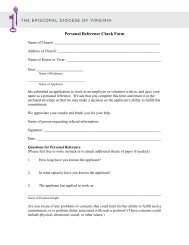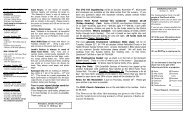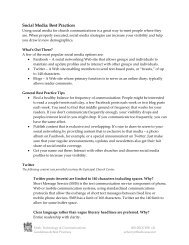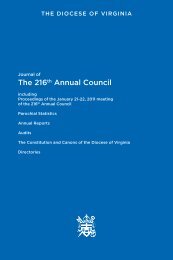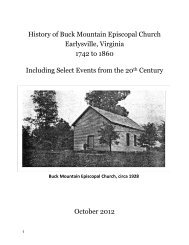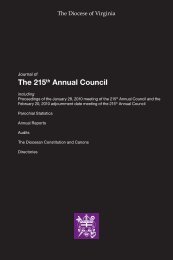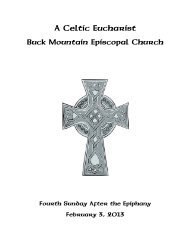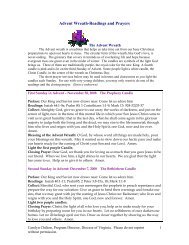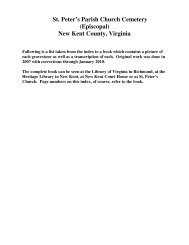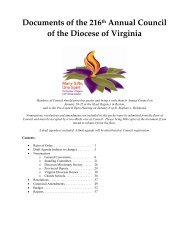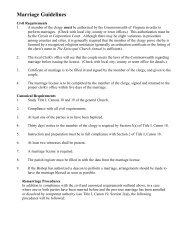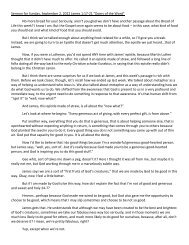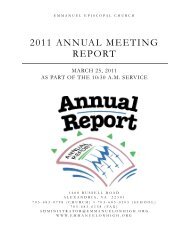The 213th Annual Council - Diocese of Virginia
The 213th Annual Council - Diocese of Virginia
The 213th Annual Council - Diocese of Virginia
Create successful ePaper yourself
Turn your PDF publications into a flip-book with our unique Google optimized e-Paper software.
<strong>Annual</strong> Reports<br />
<strong>The</strong>re is a considerable gap between the maximum levels <strong>of</strong> income and assets qualifying<br />
for low-income facilities and the comfortable minimum <strong>of</strong> the CCRCs. For a number<br />
<strong>of</strong> years, the <strong>Virginia</strong> Diocesan Homes has been seeking to assist in establishing a<br />
facility that would serve this gap, that we call the “mid-income” level <strong>of</strong> the population.<br />
Although we have explored specific projects, for various reasons none have so far<br />
moved beyond the exploratory stage. Our Development Committee would be interested<br />
in meeting with any group that is interested in pursuing such a project and would be<br />
pleased to explain further the assistance that would be available from us and what would<br />
be necessary to qualify for such assistance.<br />
Financially, as the result <strong>of</strong> a bequest a number <strong>of</strong> years ago, funds are available to assist<br />
a qualified organization that is pursuing our goals. As they were being developed all<br />
the facilities above were involved with and assisted by <strong>Virginia</strong> Diocesan Homes. VDH<br />
presently exercises stewardship over its financial resources by investing them with the<br />
Diocesan Trustees <strong>of</strong> the Funds that have performed very well relative to the market over<br />
the past few years.<br />
Recently, the Board has adopted a number <strong>of</strong> initiatives intended to enhance its focus<br />
on the establishment <strong>of</strong> additional housing alternatives for the elderly and to enhance<br />
the Boards efforts to parishes and the broader community aware <strong>of</strong> its mission. We look<br />
forward to continuing to serve the <strong>Diocese</strong> in the future as more <strong>of</strong> the “baby boomers”<br />
reach the point at which they begin to consider residential care.<br />
Su b m i t t e d b y Wi l l i a m “Bi ll” Fe t s c h, Pr e s i d e n t<br />
Westminster Canterbury Richmond<br />
Founded in faith by the Episcopal and Presbyterian churches, Westminster Canterbury<br />
Richmond always has recognized the need to enrich the lives <strong>of</strong> older adults on multiple<br />
levels. In 2007, our efforts have evolved into a variety <strong>of</strong> initiatives designed to strengthen<br />
the body, inspire the mind and nurture the spirit. <strong>The</strong>se initiatives form the basis for a<br />
new strategic plan that positions Westminster Canterbury for the years ahead. <strong>The</strong> plan<br />
addresses needs in four areas key to future success: facilities, lifestyle health services and<br />
quality staff.<br />
Body<br />
<strong>The</strong> strategy to develop “world class” health services was a year-long focal point. Plans<br />
began for the $22-million renovation and expansion <strong>of</strong> the Mary Morton Parsons Health<br />
Center and Pavilion assisted living to support the Project H.O.M.E. model <strong>of</strong> residentcentered<br />
care delivered by staff-directed work teams. <strong>The</strong> shift from a traditional<br />
clinical service model to a more homelike environment is based on the successes <strong>of</strong> the<br />
Gables memory support program. <strong>The</strong> program continues to evolve to promote greater<br />
independence, flexibility and choice in each resident’s daily life.<br />
Another health services goal was achieved in February with the appointment <strong>of</strong><br />
Westminster Canterbury’s first full-time medical director, Dr. Kevin Fergusson, which<br />
began paying immediate dividends in terms <strong>of</strong> improved service for residents. Only a<br />
few continuing care retirement communities in <strong>Virginia</strong> have a fulltime medical director.<br />
WELL Connected, a comprehensive wellness program, was created in response to<br />
increased resident interest in fitness. <strong>The</strong> program educates residents about balanced<br />
holistic wellness, and celebrated its first year with membership <strong>of</strong> 67 residents.<br />
148<br />
<strong>The</strong> <strong>Diocese</strong> <strong>of</strong> <strong>Virginia</strong> t Journal <strong>of</strong> the the 213 th <strong>Annual</strong> <strong>Council</strong>



